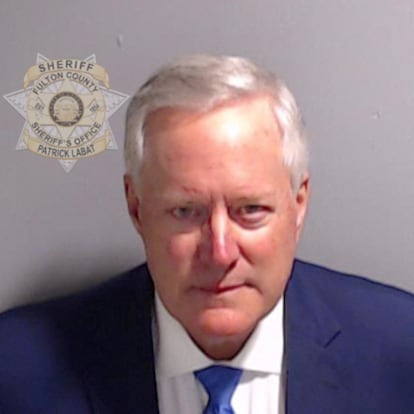The Mark Meadows case: A preview of how Trump will be tried in Georgia?
The former White House chief of staff requested to have his case transferred from state to federal court, which could be key in the future of the racketeering trial against him and 18 other people, including the ex-president

Mark Meadows is not Donald Trump. But the hearing that was held this Monday in Georgia, in which the former White House chief of staff requested to have his case transferred from state to federal court, may be key in the future of the trial against him and 18 other people, including Trump himself, indicted on charges they participated in a wide-ranging illegal scheme to overturn the results of the 2020 election. All 19 have been scheduled for arraignment on September 6, when they may enter pleas in Fulton County Superior Court.
In a very unusual step, and one that experts consider risky for him, Meadows testified as a witness on Monday in Atlanta, Georgia, for almost three hours before federal judge Steve Jones. His argument for transfer to a federal court is that his participation in the acts of which he is accused occurred in his role as a government official, and therefore they are the responsibility of a federal court. It is a strategy that four other defendants in the case have already adopted, and it is certain that Trump himself will follow it sooner or later as well. What Judge Jones decides could influence the steps that the former president will take in this case, his fourth indictment in as many months.
During questioning by the defense and the prosecution, Meadows did not deny that he participated in the events of which he is accused, but he insisted that he did so in the performance of his duties as chief of staff. Those months between Trump’s electoral defeat in November 2020 and the former president’s departure from the White House on January 20, 2021 were “a difficult time,” he declared, in which he was “invited to almost every meeting” that Trump held over the results of the elections. He attended because, he alleges, there was a “federal interest” in holding free and fair elections.
It was part of his job to make sure that the president is safe and sound and in a condition to carry out his job, the former senior official said in court. “To make it clear, what I do is serve the President of the United States.”
The advantages of having the trial held in federal court are significant for the defendants. If the argument that the alleged criminal acts were committed in the exercise of their duties as federal officers is accepted, it is more likely that judges will rule that they enjoyed immunity and dismiss the case. And if it did go to trial, the jury would be drawn from a variety of Georgia counties, making it more likely that at least one juror with Republican leanings would side with them. If the case were to remain in the state circuit, the trial would be held in Fulton County, which has a large Democratic majority. Having a portion of the jury on your side, however small, is important as the verdict must be reached unanimously.
Fulton County District Attorney Fani Willis, who brought racketeering charges against the 19 individuals on August 14, insists that the case should stay in Fulton County because the alleged crimes were committed with the sole purpose of keeping Trump in the White House despite having lost the election (in Georgia, he lost by a mere 11,779 votes) and therefore, they were acts of a political nature. The Hatch Act prohibits federal government officials from engaging in partisan politics.
Willis wanted the trial to begin on March 4, but it will no longer be possible: on Monday, U.S. District Judge Tanya Chutkan set a March 4, 2024, trial date for Donald Trump in the federal case in Washington, charging the former president with trying to overturn the results of the 2020 election, rejecting a defense request to push back the case by years. The prosecutor’s intentions to hold a speedy trial may be further complicated by the various motions filed by defendants, both for the transfer of the case to the federal circuit and to hold the trial as soon as possible, in some cases.
Meadows is accused of engaging in meetings and communications with state legislators to keep Trump in power; traveling to counting centers outside Atlanta where a ballot audit was taking place; and of participating in a January 2, 2021 call between Trump and Georgia Secretary of State Brad Raffensperger, in which the president pressured the state official to “find” 11,780 votes, the number needed to declare victory over the Democratic candidate Joe Biden.
Sign up for our weekly newsletter to get more English-language news coverage from EL PAÍS USA Edition
Tu suscripción se está usando en otro dispositivo
¿Quieres añadir otro usuario a tu suscripción?
Si continúas leyendo en este dispositivo, no se podrá leer en el otro.
FlechaTu suscripción se está usando en otro dispositivo y solo puedes acceder a EL PAÍS desde un dispositivo a la vez.
Si quieres compartir tu cuenta, cambia tu suscripción a la modalidad Premium, así podrás añadir otro usuario. Cada uno accederá con su propia cuenta de email, lo que os permitirá personalizar vuestra experiencia en EL PAÍS.
¿Tienes una suscripción de empresa? Accede aquí para contratar más cuentas.
En el caso de no saber quién está usando tu cuenta, te recomendamos cambiar tu contraseña aquí.
Si decides continuar compartiendo tu cuenta, este mensaje se mostrará en tu dispositivo y en el de la otra persona que está usando tu cuenta de forma indefinida, afectando a tu experiencia de lectura. Puedes consultar aquí los términos y condiciones de la suscripción digital.








































